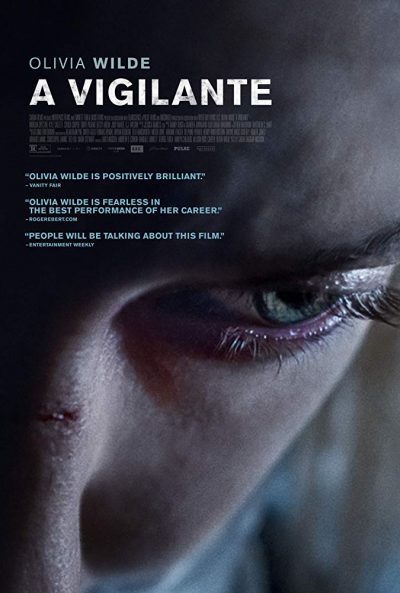★★★
“The grubby truth about vengeance.”
 Sadie (Wilde) has escaped from an abusive relationship with her husband (Spector), but at a terrible cost: the death of her son. In an effort to come to terms with her grief, and make use of the survivalist skills forcibly imposed on her, she becomes a vigilante. Responding to coded messages left on her phone, she travels around to confront abusers and prove that there is someone tougher, willing to stand up for the victims against them. But this doesn’t give Sadie the closure or peace that she seeks. Before she can help others, she’s first going to have to help herself, and confront the man who made her what she is.
Sadie (Wilde) has escaped from an abusive relationship with her husband (Spector), but at a terrible cost: the death of her son. In an effort to come to terms with her grief, and make use of the survivalist skills forcibly imposed on her, she becomes a vigilante. Responding to coded messages left on her phone, she travels around to confront abusers and prove that there is someone tougher, willing to stand up for the victims against them. But this doesn’t give Sadie the closure or peace that she seeks. Before she can help others, she’s first going to have to help herself, and confront the man who made her what she is.
There’s a grim, messy realism about this, which is plausible, and is both the film’s biggest strength and its greatest weakness. Violence, or the threat thereof, doesn’t really solve anything, and there’s precious little satisfaction gained by Sadie from it. Or anyone else: you could argue that, by robbing others of their agency, she’s doing more harm than good. But nor does this mundane approach make for great cinema. It’s one thing to rob vigilante violence of its adrenaline-powered rush, and the film consciously does that, even cutting away during the final confrontation between protagonist and antagonist. However, the film-maker needs to find something to replace it, otherwise you’re left with an empty experience. Admittedly, that may be the intended conclusion here. Yet if your point is the pointlessness of it all… what’s the point?
There is something to be said for the banality of the evil we see portrayed here, especially in the first case, when the well-dressed businessman is revealed to be an abuser. Yet, I can’t help noting the complete lack of any due diligence by Sadie. If a woman says she’s abused, well, that’s clearly good enough to justify a good helping of the old ultraviolence. A less polemic film might have leveraged that into its story, though again, perhaps her lack of interest in justice (despite her stressed reluctance to kill) is part of the flawed package she represents, along with a supreme disinterest in what happens to anyone after she has left the building.
The looming presence of her abusive husband is a little too convenient, especially in the way he suddenly pops up when dramatically necessary; some kind of foreshadowing would have helped. No denying the strength of Wilde’s performance though, and you get to see and feel every ounce of pain as she experiences it, in a way that becomes almost uncomfortable to watch. In the end, however, it doesn’t really tell us anything we didn’t already know. No matter how many “upbeat” vigilante movies I see, I enjoy them purely for the cathartic exercise, not as a primer. I don’t think I need a cinematic antidote like this, in order to be reminded that it’s actually not a good thing to take the law into your own hands.
Dir: Sarah Daggar-Nickson
Star: Olivia Wilde, Morgan Spector, Kyle Catlett, C.J. Wilson




